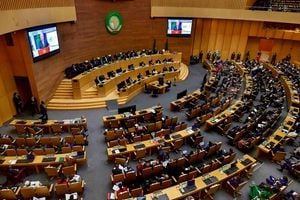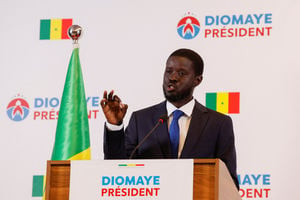
Goma, DRC Ambassadorial nominee Charles Githinji Keiru before the National Assembly Committee on Defence, Intelligence and Foreign Relations at the County Hall on Thursday April 11, 2024 for vetting.
Kenya was conceived as a merit-based society, but successive regimes have pushed the country off the rails of meritocracy.
The tragic and slow death of meritocracy in Kenya became clear from the proceedings of the Parliamentary Committee on Defence, Intelligence and Foreign Relations, which sat on April 12, 2024 to ascertain the suitability and professional competence of President William Ruto’s 27 nominees for the positions of ambassador, high Commissioner and Counsel-General.
The Committee was struck mute by Ruto’s nominee for the Consul General in Goma, the Democratic Republic of Congo (DRC) Charles Githinji Keiru, a high school graduate, who appeared unprepared and manifestly lacked basic knowledge on his duty station.
“GDP is the current population and the escalation of the population of a country,” Keiru responded when asked what Gross National Product (GDP) meant. Keiru, whose only job experience has is running a petrol station, promised to “go back to foreign affairs academy to learn more about this job.” Statistics as of 2024, indicate just over 495,000 Kenyans with at least a degree, among them unemployed, but holders of degrees in diplomacy and international studies.
Granted that holding a degree or a diploma is not obligatory for a diplomatic posting, but appointees should have basic knowledge to help in the formulation and execution of Kenya’s foreign policy, safeguarding national interests, and advocating for the commercial interests of Kenyan citizens. Merit matters.
Meritocracy is the true foundation of a functioning democracy. Kenya’s 2010 Constitution envisages a democratic society anchored on meritocracy, an ideal system where progress is based on ability and talent, rather than on class, privilege, race, wealth or personal whims of those wielding power. As a political model, meritocracy means a form of government whose leaders rise on the basis of their character, abilities and talent to help the country achieve high quality decisions, high pace of decision-making, transparency and most importantly, low barrier to progress at all levels.
In this ideal society, the playing field is levelled and every citizen has a chance to succeed based on their own merit. Morally speaking, meritocracy reduces inequality and creates an elite that gives everybody a fair chance at success.
Far from inventing the wheel, Kenya should take to heart the hard lessons of history.
In ancient Greece, Plato opined that meritocracy is the only kind of society that can ensure people get their dues and a just society flourish. China was the first power in the world to develop a meritocratic bureaucracy based on the Confucian philosophy of merit that gave rise to keju, a civil exam system through which top government officials were selected and promoted on a competitive basis.
Today, for Chinese to become one of the seven members of the governing presidium, the Politburo Standing Committee, one must have served two terms as provincial governor or its equivalent and governed at least 100 million people for at least ten years. Based on this high bar, Chinese political scientist, Zhang Weiwei, concludes that China cannot produce a George W. Bush or a Donald Trump.
Singapore, under Lee Kuan Yew and his successors, is a modern success story of a flourishing meritocracy where citizens are reward solely on the basis of their demonstrated abilities, achievements, honesty and pragmatism.
In Kenya, a high quality, equitable and adequately funded education system has always been touted as a great universal equaliser and foundation of a prosperous merit-based democratic society. In 2003, President Mwai Kibaki re-introduced the widely praised Free Primary Education programme, laying foundation for meritocracy, paving the path to progress.
The free education even allowed the oldest person to enrol in primary school. Kimani Maruge, an ex-Mau Mau veteran, seized the opportunity to enroll in primary school at the age of 84, becoming a head boy at age of 86. His moving story inspired the 2011 biographical drama film, The First Grader, by Justin Chadwick. “Education has enabled our citizens to acquire the competencies we require to run the government,” Kibaki said. His style of non-interference was a game-changer, allowing fair competition and promotions by merit.
Upon taking power in 2013, President Uhuru Kenyatta’s Jubilee administration stressed an apolitical Cabinet of professionals and technocrats. The slow death of meritocracy, however, started when the regime appointed election losers, loyalists, cronies and cranks to pivotal positions. Kenyatta awarded Martin Kamotho, alias ‘Githeri Man’ whose only claim to fame was eating githeri (boiled maize and beans) while queueing to vote in the 2017 elections, with the coveted Head of State Commendation reserved for men and women of proven integrity and outstanding roles and contribution to the country and society.
“Those awards have been reserved for socialites, criminals, drug dealers, funders of presidential campaigns, Githeri Man and the likes,” quipped renowned activist, Boniface Mwangi.
Dr Ruto is a paradox of meritocracy. His humble background and “chicken-hawker-turned-president” story is a perfect narrative of a merit-based democracy. Inversely, since 2022, his reign has also heightened the crisis of meritocracy. In the fullness of time, the world will perhaps marvel at the must-read biography of Rashid Echesa, a lower primary school dropout who rose to the upper echelons of power and national prominence, becoming a Cabinet Secretary and Ruto’s friend.
The exception to this narrative is the appointment of Francis Ogolla as Chief of Defense Staff, which followed the system of meritocracy introduced by the “Tonje Rules”, which combine merit and rotation of leadership in the three arms of the military (Army, Airforce and Navy). The Tonje Rules have shielded the military from political meddling, preventing the parochial considerations of the political class from derailing the tigid and fair, merit-based military structure.
Kenya has to break the shackles of mediocrity and return to the progressive values of meritocracy, integrity, and innovation. This is the country’s only path to progress.
- Prof Kagwanja is a former Government Adviser, CEO at the Africa Institute and Adjunct Scholar at the University of Nairobi and the National Defence University, Kenya.









